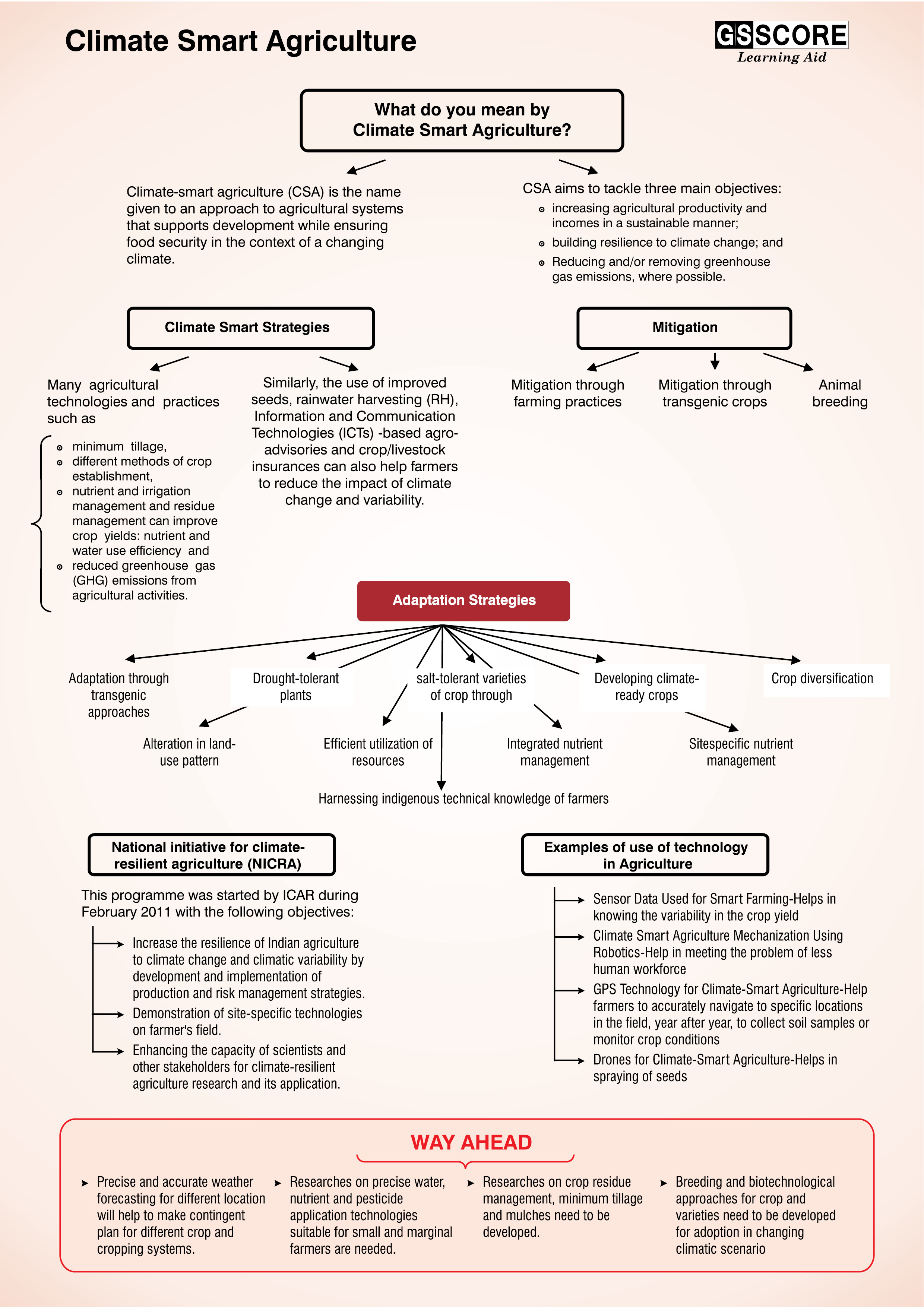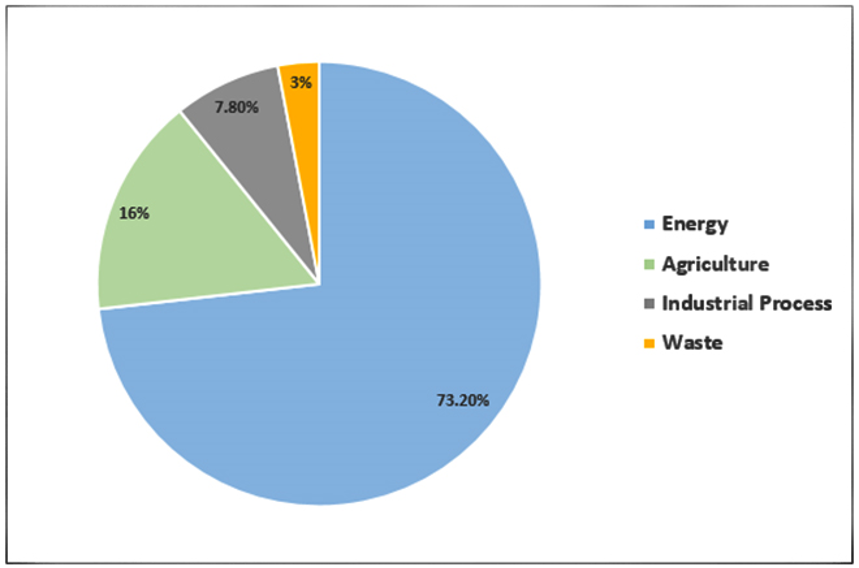

The agriculture sector is an integral part of India’s growth story. It employs 58 percent of the population and contributes 18 percent of the country’s GDP. It is responsible for both food and nutritional security and is key to efforts towards alleviating poverty and reducing inequality. In the first quarter of 2020, agriculture was the only sector that showed some growth (3.4 percent) when the economy contracted overall by a massive 23.4 percent. At the same time, agriculture contributes 16 percent of the total greenhouse gas emissions in the country, second only to the energy sector
Distribution of GHG Emissions (Gg CO2e) by sector
If India is aiming to transition to a green economy and achieve its Sustainable Development Goals (SDGs), it will have to pay greater attention to the agricultural sector. Agriculture can yet prove to be a catalyst for India to achieve a standard of inclusive, green growth. It is important, therefore, to create a pathway towards climate-smart agriculture that is not just accessible and feasible to India’s small and marginal farmers, but also creates a stable income stream. Consequently, a just transition to climate-smart agriculture requires combining the need for stabilised farmers’ incomes with the shift towards greener and less climate-exhaustive practises.
- Many agricultural technologies and practices such as minimum tillage, different methods of crop establishment, nutrient and irrigation management and residue management can improve crop yields: nutrient and water use efficiency and reduced greenhouse gas (GHG) emissions from agricultural activities.
- Similarly, the use of improved seeds, rainwater harvesting (RH), Information and Communication Technologies (ICTs) ‐based agro‐advisories and crop/livestock insurances can also help farmers to reduce the impact of climate change and variability.
- In general, the CSA options integrate innovative and traditional technologies, practices and services that are relevant for particular location and reduce the effect of climate change and provide the opportunities to stand such changing scenario.
- Adaptation and mitigation are complementary strategies for reducing and managing the risks of climate change.
- Substantial reduction in GHG emission over the next few decades can reduce the occurrence of climatic variability in the twenty‐first century and beyond, increase prospects for effective adaptation, reduce the costs and challenges of mitigation in the longer term and contribute to climate‐resilient pathways for sustainable agriculture.
Mitigation through farming practices
- A change in the system of cultivation, cultural practices, nutrient management and water management helps to reduce the emission of greenhouse gases
Mitigation through transgenic crops
- Agriculture contributes significantly to greenhouse gas (GHG) emissions.
- As indicated by researchers, there is a need to give priorities to develop new varieties of crops cultivars that can reduce GHG emissions in farming systems.
- In this regard, GM crops have been contributing to lower GHG emissions through reducing fuel use, due both to less pesticide applications and increasing the area grown under conservation agriculture (CA), which involves practices such as ‘no‐till’ or ‘reduced‐till’.
- It is reported that, in 2012, GM crops were grown roughly on 12% of the world’s arable land, which reduced over 26.7 billion kg of carbon dioxide (CO2) or the equivalent of removing nearly 12 million cars from circulation with a total reduction.
Animal breeding
- About one‐fifth of global CH4 emissions are from enteric fermentation in ruminant animals.
- Apart from various rumen manipulations and emission control strategies, genetic engineering is a promising tool to reduce these emissions.
- The most practical and rapid mitigation procedure may be to reduce the per cow CH4 emission through animal breeding and genetic selection for feed efficiency as it is permanent and cumulative.
- Other options like manipulation in diet composition, supplementation of feed additives and selection of forage plants of high quality for breeding provide solution for reduced CH4 emission from enteric fermentation.
Adaptation is a key factor that will shape the future severity of climate change impacts on food production. To deal with the impact of climate change, the potential adaptation strategies are as follows:
- Adaptation through transgenic approaches: Transgenic approaches are one of the many tools available for modern plant improvement programmes. This approach involves manipulation of genetic material and the fusion of cells beyond normal breeding barriers.
- Drought: Several drought‐tolerant transgenic plants, including rice, tomato, soybean, maize, barley and Arabidopsis have been developed. Such genetically engineered plants have generally been developed using gene‐encoding proteins that control drought‐regulatory networks.
- Salinity: Climate change also causes salinity due to effect on soil water and increase in temperature. Therefore, there is an urgent need to develop salt‐tolerant varieties of crop through conventional breeding and transgenic approaches
- Developing climate‐ready crops: Development of new crop varieties with higher yield potential and resistance to multiple stresses (biotic and abiotic) will be the key to maintain yield stability. Several drought tolerance varieties have been released in South and Southeast Asia.
For example, in 2010 the variety Sahbhagi Dhan, released and notified in India, showed a consistently good performance under transplanted low‐land conditions and rain‐fed direct‐seeded upland.
- Crop diversification: Major shift in terms of diversification of agriculture into crops, commodities, enterprises and cropping/farming systems is called upon to revert the process of degradation of natural resources, rejuvenations of waste lands and also to make agriculture a profitable business.
- Alteration in land‐use pattern: Change in location of crop and livestock, adjustment in cropping pattern, planting time and methods, fertilizer and pesticide use pattern, and other management practices help to reduce the risk of climate.
- Conservation agriculture: Conservation agriculture (CA) is defined as resource‐saving agriculture crop production that strives to achieve acceptable profit together with high and sustained production level while concurrently conserving the environment.
- Efficient utilization of resources: The resource‐efficient technologies comprises those technologies which improve resource use efficiency and provide immediate economic benefits like conservation of natural resources (water, soil, biodiversity and climate), reduce production cost, reduce environmental pollution and ultimately increase yield and income of small and marginal farmers.
- Integrated nutrient management: Integrated nutrient management (INM) system or integrated plant nutrient supply (IPNS) system is a practice which aims at achieving a harmony by efficient and judicial use of chemical fertilizers in conjunction with organic manures, use of well‐decomposed crop residues, green manures, recyclable waste, compost including vermin-compost, using legumes in crop‐ ping systems, use of bio‐fertilizers and other locally available nutrient sources for sustaining soil health and amelioration of environment as well as enhancing crop productivity on long‐term basis.
- Site‐specific nutrient management: Site‐specific nutrient management (SSNM) is a plant‐based approach for managing the nutrient requirements of crop. It provides principles and tools for supplying nutrients as and when needed for plant to achieve high yields while optimizing the use of nutrients from indigenous sources.
- Harnessing indigenous technical knowledge of farmers: There is a wealth of knowledge on the range of measures that can help in developing technologies to overcome climate vulnerabilities. There is a need to harness the indigenous technical knowledge and fine‐tune them to suit the modern situation. Ecological‐based traditional knowledge could provide insights and viable options for adaptive measures.
- Integrated Farming System (IFS): Integrated farming system is defined as the integration of different interrelated, interacting and interdependent farm enterprises which are suited to agroclimatic condition socioeconomic situation of the farmers. Integrated fish‐duck farming and Rice‐fish‐poultry farming have been developed for small and marginal farmers
This programme was started by ICAR during February 2011 with the following objectives:
- Increase the resilience of Indian agriculture to climate change and climatic variability by development and implementation of production and risk management strategies.
- Demonstration of site‐specific technologies on farmer’s field.
- Enhancing the capacity of scientists and other stakeholders for climate‐resilient agriculture research and its application.
Smart agricultural practices in India promoted by ICAR are as follows:
- Rejuvenation of farming in cyclone‐ and flood‐prone coastal agro‐ecosystems through land shaping,
- Staggered paddy nursery as a contingency measure for drought,
- Water efficient direct‐seeded rice cultivation technology,
- Drum‐seeded rice for improving water use efficiency,
- Short‐duration rice cultivar for drought tolerance,
- Drought‐tolerant short‐duration finger millet varieties for late season drought in south interior Karnataka,
- Short‐duration crop varieties suitable for late sowings,
- Crop diversification for livelihood and food security, sustainability,
- Flood‐tolerant varieties impart resilience to farmers in flood‐prone areas,
- Improving the resilience of poor farmers reclaiming cultivable wastelands,
- Community tanks/ponds as a means of augmentation and management of village level water resources,
- Individual farm ponds for improving livelihoods of small farmers,
- Jalkund—low‐cost rainwater‐harvesting structures,
- Check dam‐storing excess runoff in streams,
- Rainwater harvesting and recycling through temporary check dam,
- Enhancing resilience through improvement in conveyance efficiency,
- Recharge of wells to improve shallow aquifers,
- Integrated Farming System modules,
- Captive rearing of fish seed—a livelihood opportunity in flood‐prone areas,
- Management practices to tackle cold stress in backyard poultry,
- Shelter management for small ruminants to tackle heat stress and rain storm,
- Small‐farm mechanization through Custom Hiring Centres for farm machinery,
- Improved planting methods for increasing water use efficiency and crop productivity,
- Zero‐till drill wheat to escape problem of terminal heat stress,
- In situ incorporation of biomass and crop residues for enhancing soil microbial population and soil health,
- Village level seed banks for reducing seed shortages,
- Improved fodder cultivars to solve the problem of fodder scarcity.
- Sensor Data Used for Smart Farming: Using aerospace engineering analysis techniques, tests have been carried out at National Aerospace Research Laboratory in the Netherlands (NLR) on facilitating higher yields for the potato crop for the farmers participating in the project. Although these farmers know very well their land and crops, information on how well their crop is growing using such technology will be of interest. By reference to data known on the crops during the previous month, the farmer can use the aerospace engineering based data to help determine the reasons behind the growth deficiency, if any.
- Climate Smart Agriculture Mechanization Using Robotics: Challenged by the need for mechanized monitoring, pruning, thinning, and even picking produce as alternative to declining number of human workforce,novel approach is to utilize available information technologies through the use of more intelligent machines to reduce and target energy.
- GPS Technology for Climate-Smart Agriculture: GPS technology already available in smart-phones may be utilized to determine when users should water their crops by estimating how much water the plants are using each day and factoring in area rainfall totals, via connection with the closest weather station.
- Drones for Climate-Smart Agriculture: Relatively cheap agricultural drones with advanced sensors and imaging capabilities are giving farmers new ways to increase yields and reduce crop damage.
- Precision Agriculture: Precision agriculture (PA) is a farming management concept based on observing, measuring and responding to inter and intra-field variability in crops. The goal of precision agriculture research is to define a decision support system (DSS) for whole farm management with the goal of optimizing returns on inputs while preserving resources.
- Precise and accurate weather forecasting for different location will help to make contingent plan for different crop and cropping systems.
- Researches on precise water, nutrient and pesticide application technologies suitable for small and marginal farmers are needed.
- Researches on crop residue management, minimum tillage and mulches need to be developed.
- Breeding and biotechnological approaches for crop and varieties need to be developed for adoption in changing climatic scenario.

Related Articles



